Data Science for Climate Change
Sewanee DataLab Students & Faculty Partner with Communities
Climate Change
September, 2023
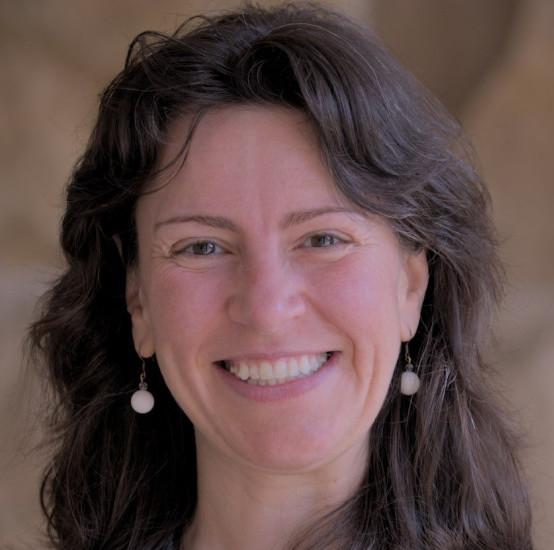
Author: Elena Eneva is the Director of DataLab and works with partners, industry mentors, and student fellows to define and lead projects that solve our partners’ real world problems and support communities. She is an AI researcher practicing across multiple social good domains, including healthcare, fighting human trafficking, and explainable and equitable AI.
Climate change is dramatically changing environments and our relationships with them, touching every area from disaster relief, resource management, and conservation to public health, wildlife safety, and pollution and waste management. Data science can help us better understand the impact of climate change and develop effective strategies for combating its damaging effects.
Four years ago at the University of the South in Sewanee, Tennessee, we started DataLab with a grant from the Public Interest Technology University Network. DataLab is a project-based data science fellowship program that focuses on problems that matter most in the world — issues of social good, particularly those connected to climate change. DataLab has focused on education, public health, equitable finance, food security, access to services, refugee assistance, and environmental protection problems.
So far, DataLab has trained 58 data scientist fellows, completed projects with 19 community partners, and partnered with 12 universities.
Some fellows we’ve trained will become full-fledged data scientists in their careers; many others will bring this understanding of data science into careers as policymakers, lawyers, educators, scientists, journalists, artists, environmentalists, and doctors. In today’s world we need more people in all public interest fields to make responsible, ethical, data-driven decisions for social good. I am very proud of DataLab’s mission and of our students for walking the path. I have great hopes for the future.
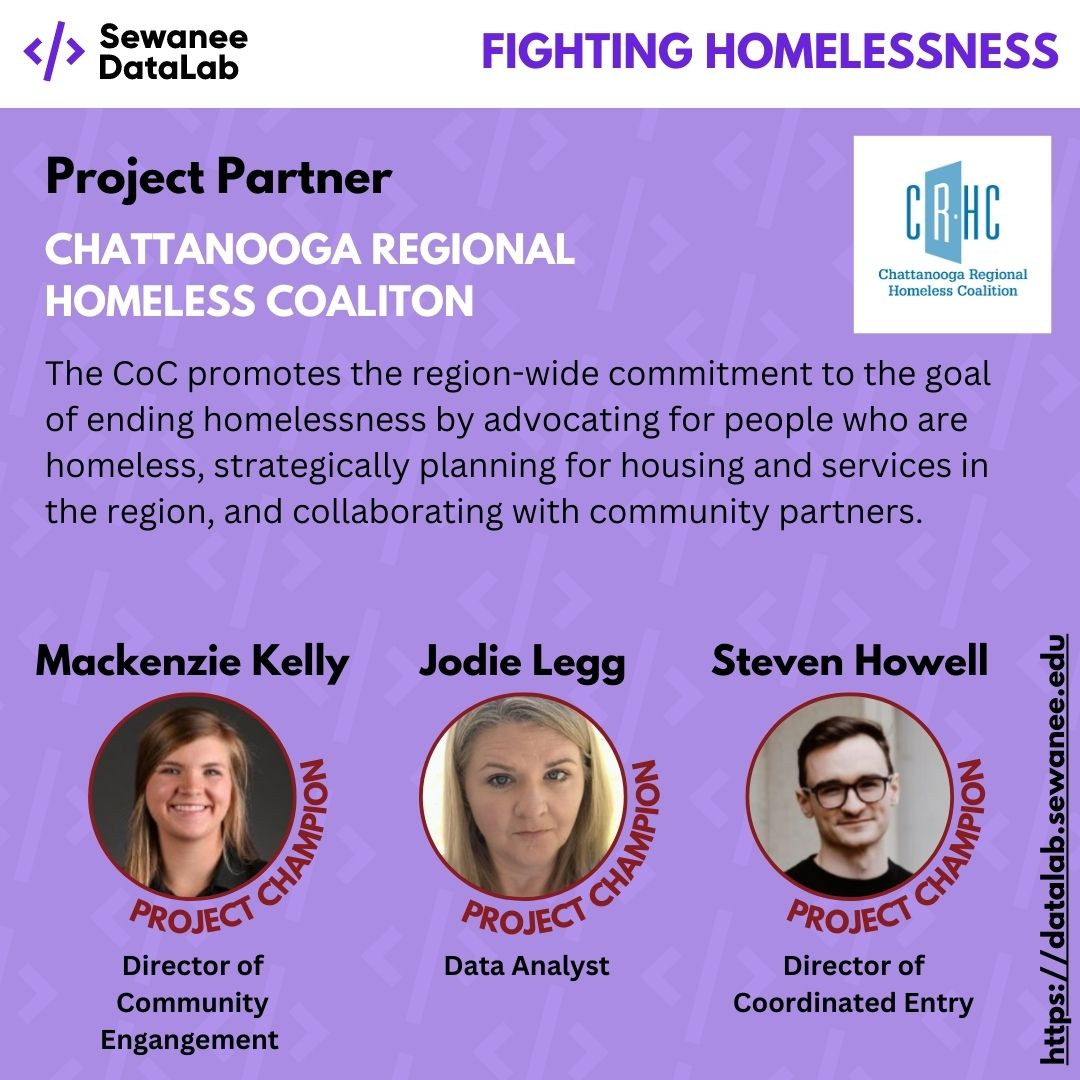
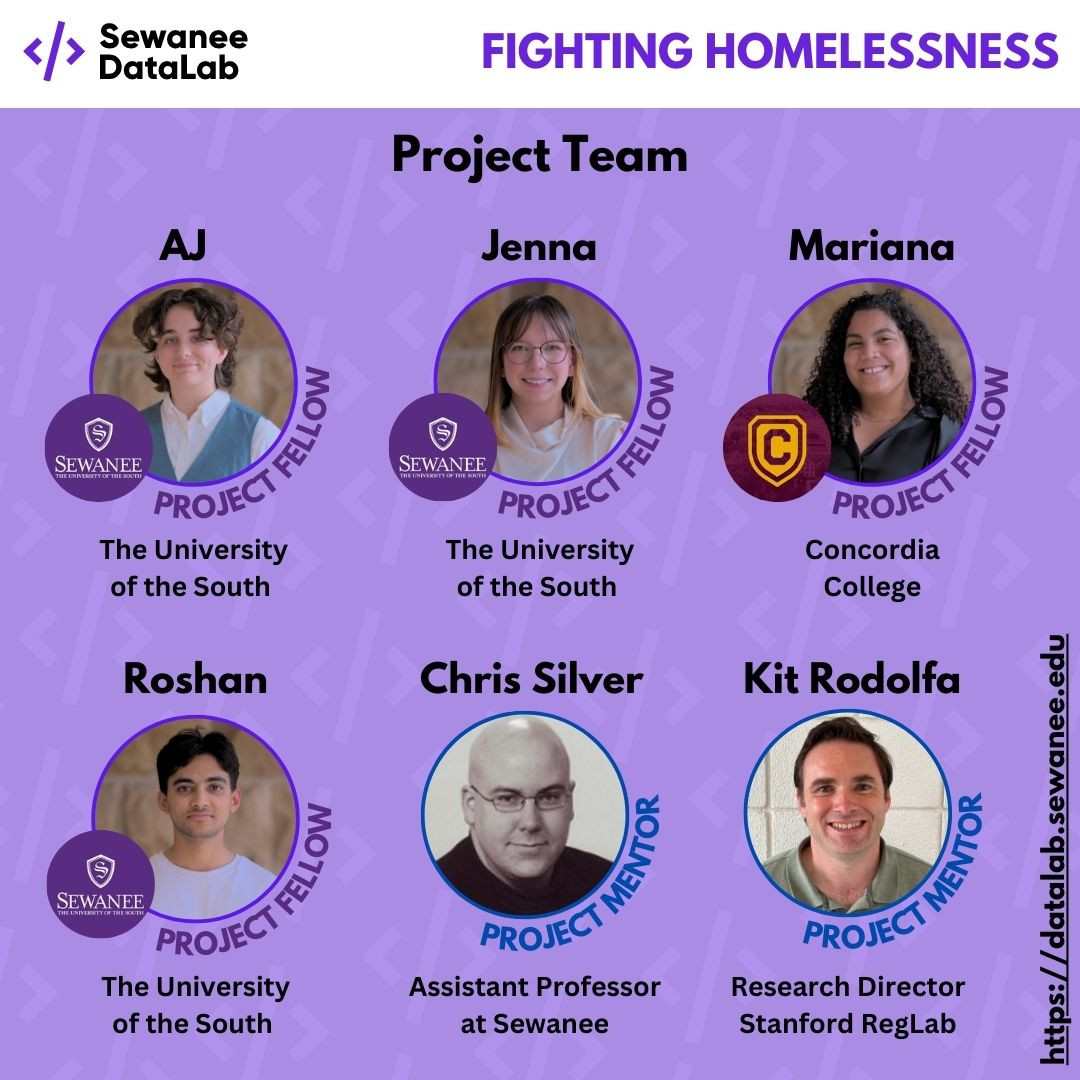
A 2023 DataLab Project with Chattanooga Regional Homeless Coalition. See all DataLab projects here.
Broadly, DataLab has three goals:
- Create responsible data scientists by engaging undergraduate university students from all over the country in solving real-world social impact problems under the guidance of industry veterans and in collaboration with our community, government, and nonprofit partners.
- Train partner organizations on how to run successful, customized data science projects for their domains, using their own data and processes to solve pressing problems.
- Make meaningful, if small, dents in real-world challenges.
One particular area that DataLab focuses on is climate change. Imagine having a crystal ball that helps us understand how our planet is transforming, from shifting weather patterns to habitability challenges, new wildlife diseases, and vanishing species. That crystal ball is data science. Data science allows us to crunch vast amounts of diverse data to spot trends, predict disasters, and craft smart climate strategies to better secure our future.
This isn’t just about saving endangered species; it’s also about securing our collective future. Data science is a valuable tool that empowers us to become proactive Earth protectors who work to keep our planet livable, and more: it enables us to nurture Earth’s ability to thrive for us humans and all other forms of life.
DataLab has recently completed three projects aimed at safeguarding our planet and ensuring a thriving biosphere for generations ahead.
1. Protecting the Bat Population
Bats are a vital part of ecosystems and have been on the decline due to white-nose syndrome, one of the worst wildlife diseases in modern history. Fellows at DataLab analyzed years of data on the behavior and habitats of local bat species and created an interactive data-driven tool to inform forest management decisions to provide healthy habitats for bat species, even as the climate changes.
2. Conserving Cave Species
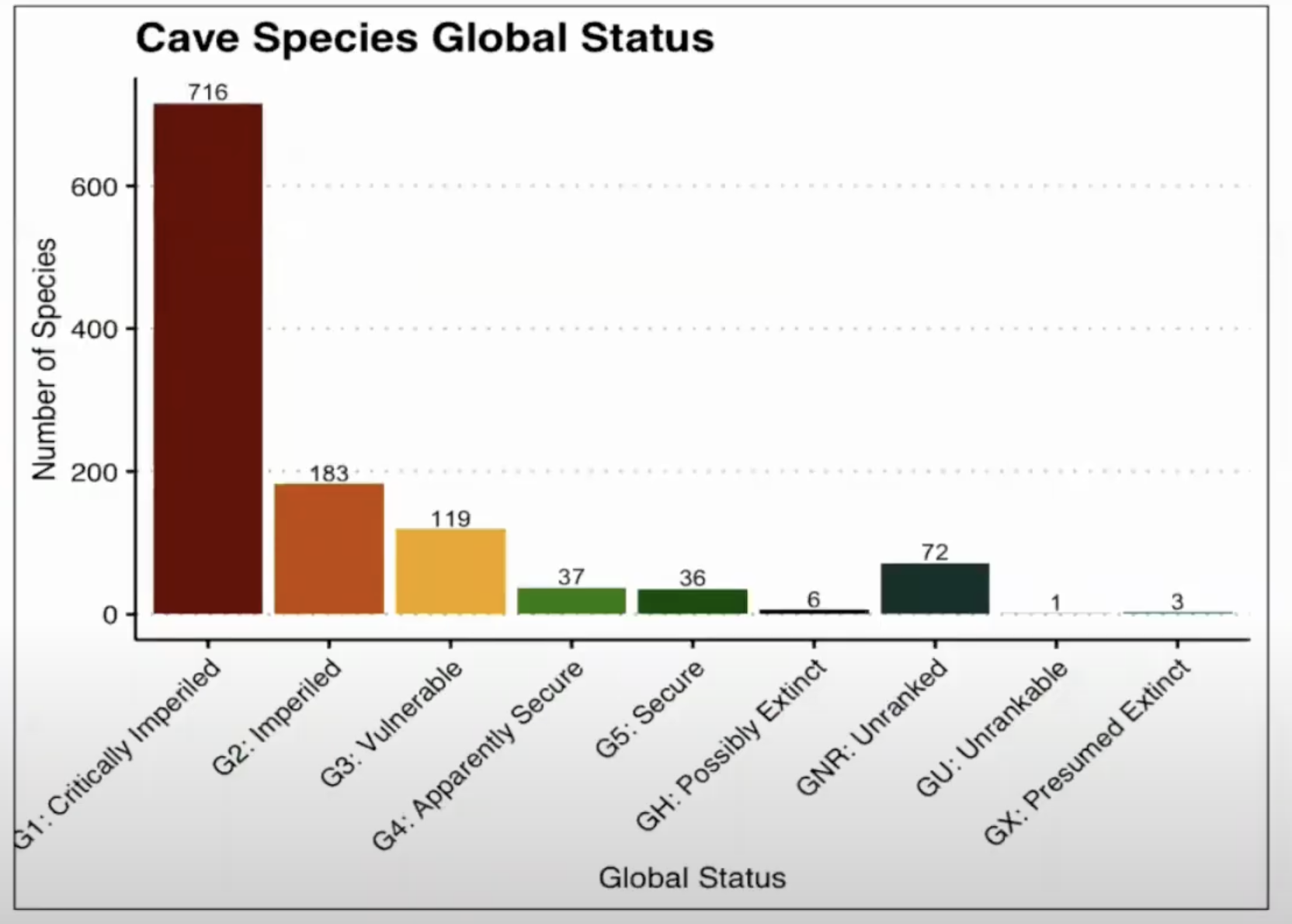
Caves hold a plethora of wildlife, however species that live in caves are going extinct at unprecedented rates. Amid this crisis, available conservation data for North American cave species over the past 20 years has gone unsynthesized, preventing us from understanding and addressing potential causes of declining population rates.
Fellows at DataLab gathered and analyzed conservation data for over 1,200 species of cave animals in the United States and Canada. This data helped us find and highlight regions with highly endangered cave species and identify critical areas in need of protection.
3. Purifying Wastewater for Rural Communities
Wastewater treatment may not be something most of us think about daily, but it is a critical pillar of our environment and public health. Wastewater treatment prevents pollutants from degrading ecosystems while safeguarding aquatic life and ensuring the quality of our drinking water sources.
However, conventional wastewater treatment comes with its own set of downsides. They require significant amounts of energy, use chemicals that can disrupt aquatic ecosystems, and create the potential for soil and water contamination.
In the context of these challenges, the promise of artificial wetlands shines brightly. These ingeniously designed systems mimic the natural wetland’s cleansing abilities, efficiently removing contaminants while offering a sustainable and cost-effective solution. Wetland treatment has been deployed and proven to work successfully on a large scale in several places in the U.S., including in Clayton County, Georgia, and Orange County, California.
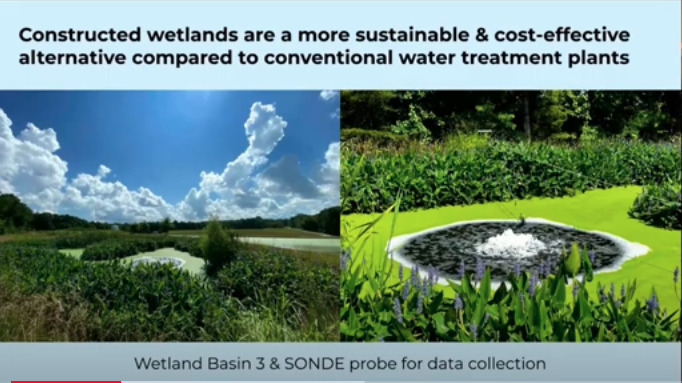
However, artificial wetlands have not yet been deployed on smaller scales in rural areas, which often bear the brunt of environmental degradation. In 2012, Sewanee biology professor Deborah McGrath started planning and lobbying for the construction of three artificial wetland basins at the Sewanee Utility District (SUD), in collaboration with the University of Georgia’s Environmental Law Practicum. In July 2016, construction was completed and the artificial wetland basins became operational alongside the existing conventional wastewater treatment system. The following year, Dr. McGrath established and implemented a monitoring program on the new wetlands.
In 2021 and 2022, DataLab partnered with Dr. McGrath to see what we could learn from this treasure trove of experimental data and to create an interactive tool that could ingest streaming data, produce insights, and adapt to changing circumstances. Armed with a mix of data from the project’s sensors, SUD’s sensors, and local weather patterns, we set off to analyze and visualize the performance of the constructed wetlands. Our goals were to find yearly, monthly, daily, and hourly trends and insights and to understand what would constitute smart strategies for deploying wastewater treatment solutions in similar rural communities.
During the course of the project, we uncovered that the wetlands had gradually stopped filtering contaminants from the wastewater. Our analysis showed that this was likely due to complex factors that decreased oxygen levels, along with weather changes, the wetlands’ limited size, and the encroachment of invasive species.
The project team installed an aerator in the wetlands to enhance oxygen levels. Partners maintaining the wetlands will use DataLab’s interactive system to study the aerator’s impact, monitor overall performance, and effectively manage the wetlands over time.
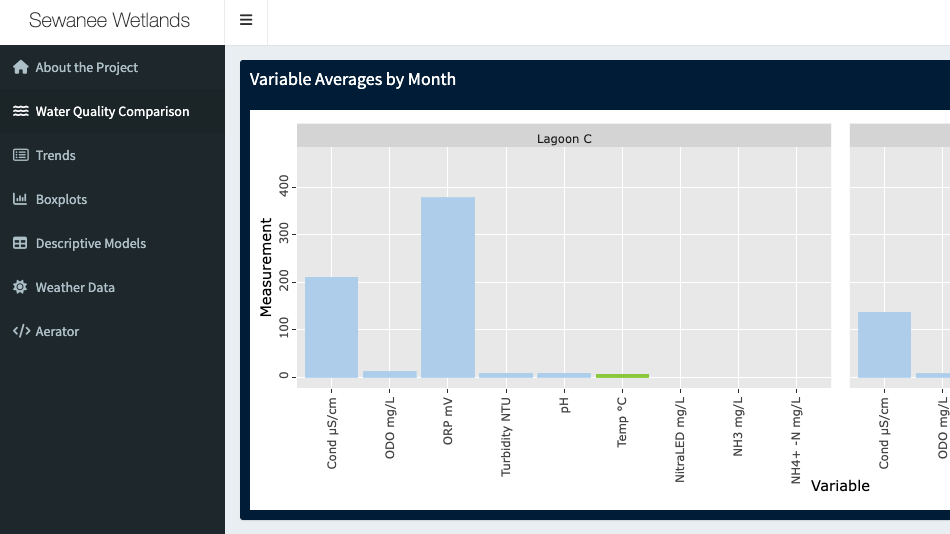
By applying data science to climate challenges in nearby rural communities, Sewanee aspires to play a pivotal role as consultants to utility districts seeking to address wastewater treatment needs. In doing so, we hope to enhance wastewater management in rural areas and foster a broader understanding of sustainable ecological solutions while training a new generation of public interest technologists primed to make an impact in whatever career path they choose.